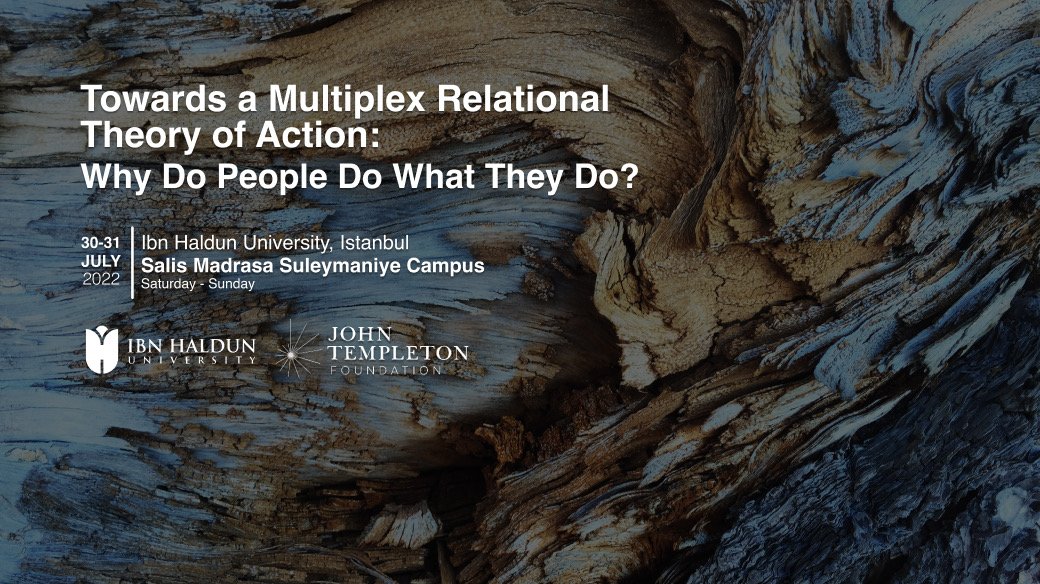
An International Conference on Towards A Multiplex Relational Theory Of Action: Why do people do what they do?
30-31 July 2022
Süleymaniye Salis Madrasa, Ibn Haldun University, Istanbul
The human being is the most comprehensive of the creation (ajmaʿ al-mawjūdāt). He is attached (taʿalluq) and connected (irtibāt) to different types of beings through each of his parts… A human being is the best of creation due to his all-connectedness, at the same time, he is the worst of creation due to this all-connectedness. – Al-Sirhindī
Our previous workshop “Islamic Thought and its Implications for Current Social Inquiry” discussed multiplexity as a comprehensive research paradigm for different academic disciplines. As a next step, we are interested in the exploration of how this general framework of multiplexity can be used in addressing specific questions in contemporary social sciences and humanities. To this aim, the current conference will test the utility of multiplex perspective in explaining and interpreting human action. More plainly put, how can we answer the following question: Why do people do what they do?
We invite participants to make an attempt to address this question from a multiplex relational perspective in their respective disciplines. By multiplex relationality, we refer to multilayered connections of a human being to social, physical, metaphysical, and divine worlds (marātib al-wujūd) throughout one’s life (marāhil al-wujūd). Multiplex relationality as complex social interaction derives from a multiplex ontology and explores not only material relations, as is the case in new materialist relational perspectives, but also relations of the human beings to different levels of existence.
This is what Ibn Khaldun calls ittisāl and sufis like Ghazali and Sirhindi name it taʿalluq. The multiplex relational approach offers a comprehensive and holistic perspective without falling prey to the reductionism of human-centric and anti-anthropocentric approaches and intends to contribute to the ongoing attempts for relational theorizing of society, culture, and persons.
From the perspective of their discipline of specialty, the presenters are expected to formulate an explanatory or interpretive framework that can be used in understanding or discovering the causes behind human action and the process through which human action is produced.
The conference is organized in the context of a two-year project on Multiplexity and aims to create an interdisciplinary environment to connect traditionally trained scholars, philosophers, social scientists, and Islamic studies scholars in joint thinking about the possibility of translating Islamic thought to modern academia and social inquiry. The broader vision of the conference is to show the mutual relevance of the work of traditional scholars and contemporary social scientists, the exploration of which will hopefully open the field to deeper conservations, more creative approaches and offer solutions pertaining to the issues in current social inquiry that have been otherwise unavailable within the dominant paradigms.
The selected papers from the conference will be published as an edited volume tentatively entitled Multiplexity: Questioning Dichotomies in Social Sciences.

We are delighted to announce that the “Islamic Thought and its Implications for Current Social Inquiry: A Multiplex Approach” workshop will be held on the 11th and 12th September 2021, at the Süleymaniye Salis Madrasa, Istanbul. The workshop is organized in the context of a two-year eponymous project and aims to create an interdisciplinary environment to connect traditionally trained scholars, philosophers, social scientists and Islamic studies scholars in joint thinking about the possibility of translating Islamic thought to modern academia and social inquiry. The broader vision of the workshop is to show the mutual relevance of the work of traditional scholars and contemporary social scientists, the exploration of which will hopefully open the field to deeper conservations, more creative approaches and offer solutions pertaining to the issues in current social inquiry that have been otherwise unavailable within the dominant paradigms.

The roundtable was organized in the context of a two-year project titled Islamic Thought and its Implications for Current Sociological Inquiry: A Multiplex Approach.